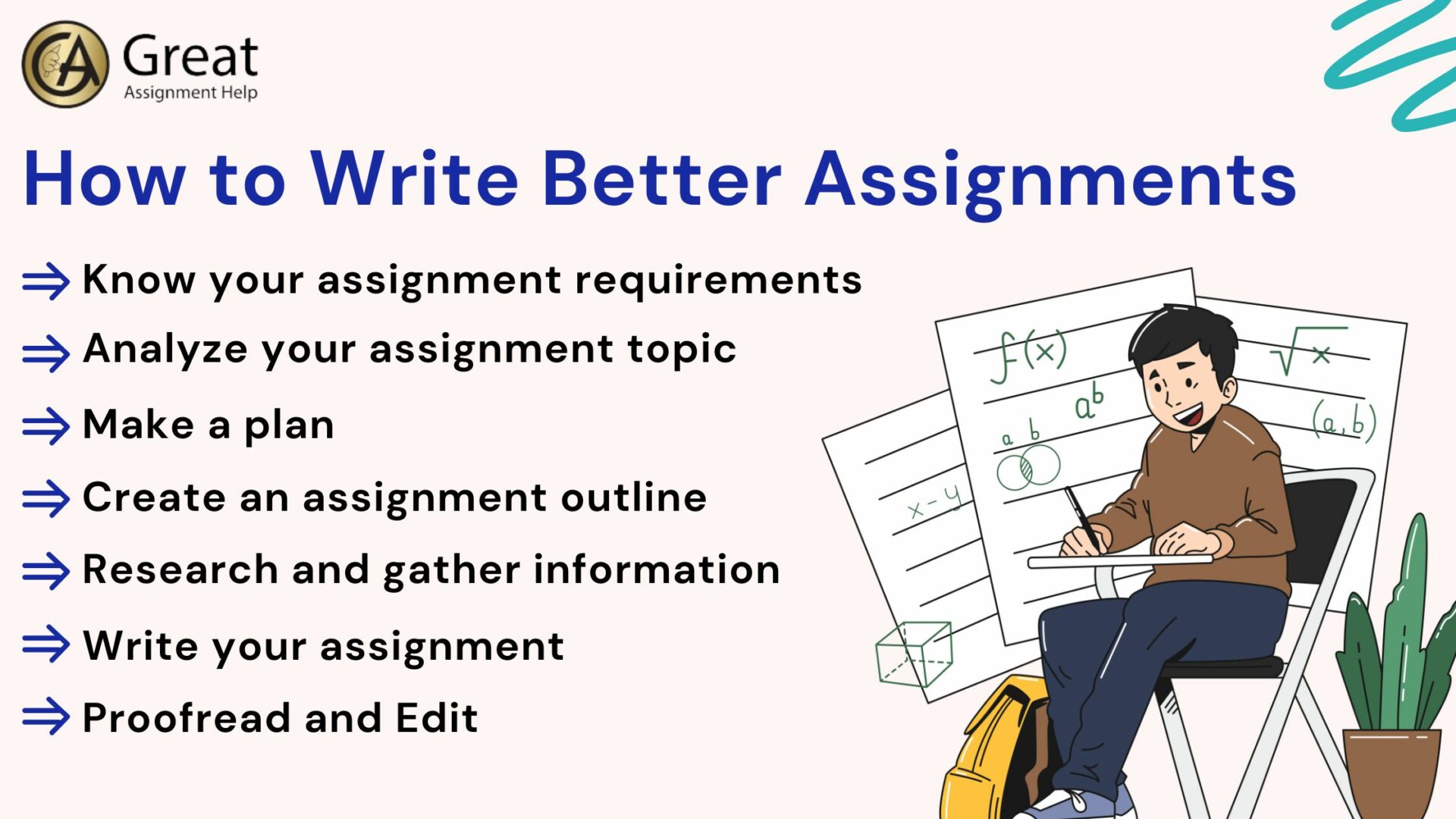Follow some valuable tips for writing assignments effectively and achieve top grades. Start by understanding the question, researching thoroughly, and creating an outline. Next, organize your thoughts using clear language and cite sources properly. Finally, edit and proofread your work to ensure accuracy. While writing assignments, manage your time well to meet deadlines.
If you are a school or college student, then as part of your course curriculum, you will be asked to prepare different types of assignments. It might be challenging for you to write your assignments, but with proper time management and planning, you can effortlessly finish them on any subject. Especially by writing a good assignment, you can enhance your grades, improve your knowledge, and develop your skills. Assignment writing is an important part of academic life, and you cannot avoid it. For your assignments, you might be asked to create essays, research papers, and so on, depending on your course of study. If you have no idea how to write your assignments effectively, then read this blog. Here, you will get to know the steps and tips for writing great assignments.
How to Write Better Assignments

Assignment writing may appear like a burden to you, but it involves many benefits. So, you must learn the Assignment Writing steps to conveniently prepare error-free and high-quality academic papers worthy of an A+ grade. The following are the steps for writing assignments effectively
1. Know your assignment requirements
To write a good assignment, you should first get a clear understanding of what is being asked. This step is crucial because you may rush and write the wrong answers due to a lack of clarity. Hence, to avoid that and set yourself up for success, take your time to carefully read the assignment questions twice or thrice. Here are some tips that will help you grasp your assignment requirements properly and plan your work effectively
- Identify keywords like “discuss,” “analyze,” or “explain” to know what you are supposed to do.
- Figure out the main focus of the assignment.
- Research the assignment topic online to gather relevant information.
- Pay attention to the assignment’s style and technical details.
- If you have any doubts about your assignment, ask your instructor to clarify it.
2. Analyze your assignment topic
If you are clear about the requirements, next, you should put effort into understanding your assignment topic well. Specifically, you should analyze the topic and identify what to include and what to avoid in your assignment paper. While you analyze, make sure to think about all the points related to the topic. Furthermore, be certain to understand every word and aspect of it in your assignment question. Besides all these, consider the factors that make your assignment writing complex. When you do so, you can plan accordingly and write a better assignment.
3. Make a plan
Before you start writing your assignment, make sure to plan effectively. Planning is more important it will help you stay focused and finish your assignment on time. Moreover, when you do proper planning, you can also cover all the requirements without omitting any. At the time of planning, first, check the marks for each section so you can allocate time accordingly. Also, understand the guidelines clearly to use your time wisely. If you want to do everything perfectly before the deadline, then make sure to plan time for research, editing, and proofreading.
4. Create an assignment outline
You can fetch good scores only if you write your assignment according to the given specifications. So, to meet your assignment requirements, make sure to create a brief outline by including all the key points. Note that your outline should concisely list the points to be discussed in your assignment. In the outline, you need not write the points in detail; just jot down the main ideas or keywords.
An outline is an assignment’s basic framework. It is like a first draft that shows the overall structure of an assignment. Typically, an assignment outline includes sections, such as the introduction, main body, and conclusion.
Before you begin writing your assignment, sketch the outline by following these steps
- In the introduction section, you should outline how you will introduce your assignment topic
- Next, you should outline the main points and supporting evidence in the body section.
- Finally, in the conclusion part, you should outline the summary of your findings.
Always write the outline in a way that is easy to follow when writing the assignment. Generally, a good assignment outline will help you stay on track, finish your work on time, and avoid plagiarism.
5. Research and gather information
Research is a crucial part of writing an assignment. To do it well, you need strong research skills. Typically, by doing research, you can find relevant information on your topic and make your assignment unique. Specifically, to gather information for your assignment, you can use resources like course materials and academic journals. Lecture recordings, sample assignments, reading lists, and discussion boards are the other sources of information that you may also use while preparing your assignments.
6. Write your assignment
Start writing your assignment after you have collected all the necessary data and information. Remember, your assignment should be accurate, well-organized, and properly cited as per the given requirements. The following are the ways to structure your assignment
- Introduction: It is the opening paragraph of your assignment. Its purpose is to give the reader a clear understanding of what the assignment is about. In the introduction section, you should set the context for your topic and include a clear thesis statement that outlines your main argument.
- Body: It is the core part of your assignment. Here, you should answer your assignment question with proper evidence and supporting details. You can have any number of body paragraphs depending on your assignment topic and word count. But each paragraph should have a similar structure, with an idea, evidence, and a link to your thesis.
- Conclusion: It is the closing section of your assignment. In this paragraph, you should conclude by summarizing your main points without introducing new ideas. Also, you can suggest areas for further research.
7. Proofread and Edit
Submitting an assignment without proofreading and editing can lead to mistakes. So, to fix this, make sure to follow the steps listed below. Proofreading will help you submit a polished and error-free assignment.
- Review your paper to make sure you have covered all questions, headings, and subheadings, and add any missing information.
- Check and correct spelling and grammar errors.
- Verify that your citations are accurate.
Key Tips for Writing Assignments Effectively
To help you out in managing your homework and other scholastic activities, here we have suggested some valuable assignment writing tips. Follow them all and come up with better assignments
- Start writing your assignment early to finish it before the deadline
- When writing your assignment, use a professional tone and explain the context using precise and appropriate language.
- Never deviate from the topic. Stay focused on your assignment topic to meet the requirements
- When you write your assignment, strictly follow the format and structure specified by your instructor.
- Cite the sources used in your assignment as per the given referencing style to avoid plagiarism issues.
- In your assignment, provide a detailed explanation instead of just yes or no answers.
Wrapping Up
By following the steps and tips suggested in this blog, you can write your assignments effectively. In case you are still struggling to come up with good assignments or homework, without hesitation, hire a subject matter expert from our platform for the best online assignment help. We are one of the reliable websites known for offering personalized online assignment help services for a wide range of subjects at affordable prices. Simply by hiring an Online Assignment Helper from our team, you can effectively finish your work as per your requirements on time and boost your grades.



